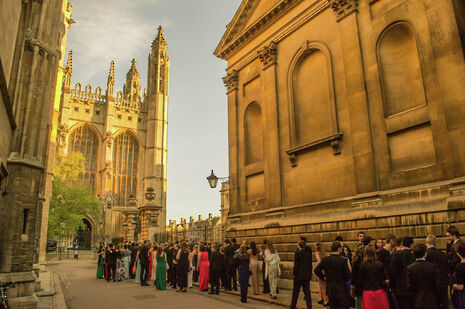Snap out of it and live in the moment
Ian Johnston says we should do more of our May Week than just photograph it

With summer approaching, those “bloody tourists”, arriving in floods and armed with iPhones and the desire to photograph Cambridge’s every quaint brick, can become the bane of students’ lives. Whether it’s avoiding occupying centre-stage of a family photo or dodging selfie sticks thrust into our paths as we cycle through town, the struggle is real. Selfie culture thrives in Cambridge; not content to merely document every passing moment of their Cambridge experience by camera, many feel they must appear in front of King’s Chapel or the Bridge of Sighs, as though doing otherwise might risk the accusation that they somehow hadn’t been there in the first place.
Yet, for all our scoffing at this behaviour, as May Week approaches, we too will capitulate to selfie fever. Modern technology has led to an explosion in image creation and where photography was once the domain of the artist, today’s David Baileys are anyone and everyone with a smartphone. That’s why our social media revolves almost entirely around photography or video: Snapchat, Instagram and the like. But, just as there is no longer any questioning of the quality of the photographer, the object of the photo is becoming increasingly mundane: alongside photos of beautiful landmarks, hidden within the amateur photographer’s album are invariably failed attempts to capture atmospheric snaps of what are no more than dingy alleyways and city streets.
I’m as guilty of this as anyone else, and yet I also laugh at those who view Cambridge almost entirely through their cameras. The democratisation of photography, enabling us all to capture our experiences, is a positive development. But, as filtered Instagrams of Granchester and punting trips fill our newsfeeds and we prepare ourselves for the bombardment of photos of suited May ball-goers and Snapchats of whoever Trinity got in when Taylor turned them down, I’m left wondering how much we differ from the tourist with the selfie stick. It seems that we need to validate our experiences with the approval of others, constantly seeking likes and converting personal events into public spectacles.
The act of photography can infringe on the experience itself. In a recent article to The Irish Times, Dr Robert Harris, a professor of philosophy at Trinity College Dublin, writes that modern culture dictates that we not only capture our experiences, but that we treat them as if they exist to be captured. By attempting to channel and control anything that seems even slightly extraordinary through a flat 2D image, we lose the opportunity to live the moment with as much intensity as we can.
Of course, we can both enjoy life and capture it with photography but the anticipation of the upload to social media and the pressure to obtain as many ‘likes’ as possible can postpone enjoyment; the act of photography becomes an integral part of the experience rather than merely a means of recording it and therefore detracts from it.
The American comedian Louis C.K. summarises the absurdity of the situation perfectly. Describing parents constantly taking pictures at a children’s party, he tells them to “just look at your kids: the resolution on the kid is unbelievable. If you just look it’s totally HD.” How often do we really look at videos of events we missed the first time around, having viewed them all through a 6-inch screen? The obsession with “doing it for the Vine” involves thrusting personal events onto others, all the while missing out on the initial experience. Even though the hilarity of the situation is clear, we often fail to realise that we are in on the act.
Come May Week, then, newsfeeds will fill with group shots at garden parties and black-tie selfies and I will no doubt contribute my fair share of blurred, uninspired snaps to the mass. The desire to record the most extravagant events of a Cambridge student’s university experience is entirely understandable; it helps to assuage the sense of sadness which comes from their passing. But let’s not allow the event to become the photograph. It seems more important to share May Week with the people we are with rather than to force it on Facebook friends who have, at best, a fleeting interest in what we do. Part of experiencing moments with intensity is not to cling to them but to let them pass, recognising the need to replace them with new ones rather than constantly reliving what has gone before. Looking back on May Week, photos will no doubt help us remember it fondly, but in the rush to record our experiences, we also need to remember to enjoy them in the first place.
 News / Fitz students face ‘massive invasion of privacy’ over messy rooms23 April 2024
News / Fitz students face ‘massive invasion of privacy’ over messy rooms23 April 2024 News / Cambridge University disables comments following Passover post backlash 24 April 2024
News / Cambridge University disables comments following Passover post backlash 24 April 2024 Comment / Gown vs town? Local investment plans must remember Cambridge is not just a university24 April 2024
Comment / Gown vs town? Local investment plans must remember Cambridge is not just a university24 April 2024 Interviews / Gender Agenda on building feminist solidarity in Cambridge24 April 2024
Interviews / Gender Agenda on building feminist solidarity in Cambridge24 April 2024 Comment / Does Lucy Cavendish need a billionaire bailout?22 April 2024
Comment / Does Lucy Cavendish need a billionaire bailout?22 April 2024





